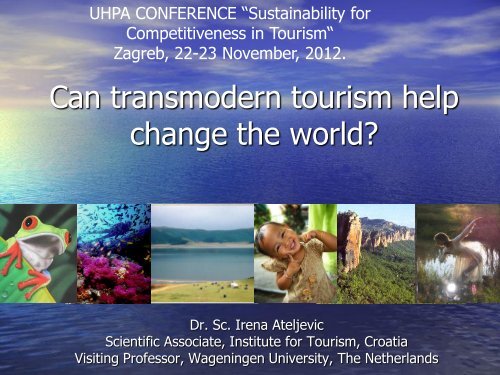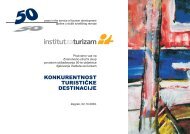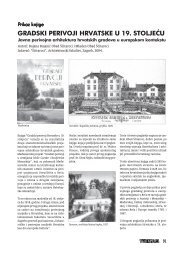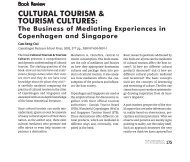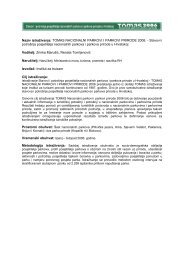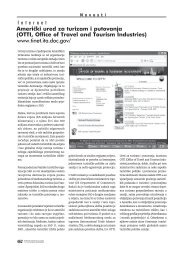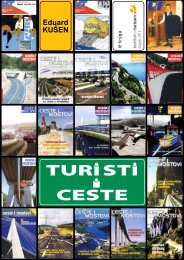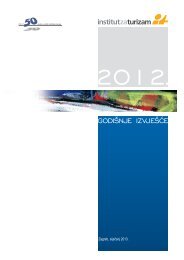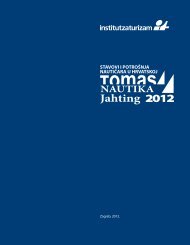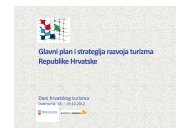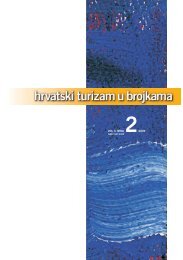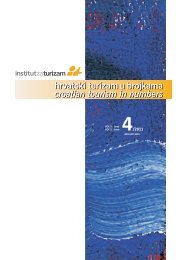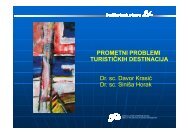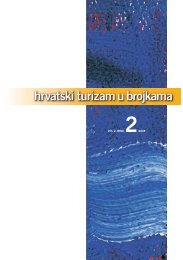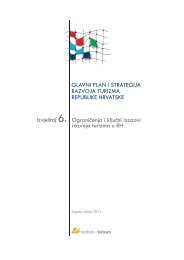Transmodern Tourism Connecting the World?
Transmodern Tourism Connecting the World?
Transmodern Tourism Connecting the World?
Create successful ePaper yourself
Turn your PDF publications into a flip-book with our unique Google optimized e-Paper software.
UHPA CONFERENCE “Sustainability for<br />
Competitiveness in <strong>Tourism</strong>“<br />
Zagreb, 22-23 November, 2012.<br />
Can transmodern tourism help<br />
change <strong>the</strong> world?<br />
Dr. Sc. Irena Ateljevic<br />
Scientific Associate, Institute for <strong>Tourism</strong>, Croatia<br />
Visiting Professor, Wageningen University, The Ne<strong>the</strong>rlands
Years<br />
Available hectares of land per capita<br />
Sustaining <strong>the</strong><br />
Environment<br />
Increase of Population<br />
http://www.youtube.com/watch?v=oDlb<br />
9vfgI<br />
Source: Faostat 2006
Sustaining our Well Being & Health<br />
Plastic Production<br />
European Commission, DG ENV, 2010
Sustaining our<br />
livelihoods
GLOBAL DISEASE:<br />
CORRUPTION AND GREED
Sustaining our Well Being &<br />
Health<br />
Poverty and Inequalities Unhappiness Obesity<br />
Consumerism
Sustaining our Well Being & Health<br />
Consumption from 1991 to 2001:<br />
- 3 times higher in UK<br />
- 4 times higher in USA<br />
THE OBSERVER, UK<br />
<strong>World</strong> Health Organization,<br />
2002
Sustaining our Well Being &<br />
Health
FOOD AND POVERTY<br />
The poorest 40% of <strong>the</strong> world’s<br />
population accounts for 5% of<br />
global income. The richest 20%<br />
accounts for three-quarters of<br />
world income.<br />
1 in 5 of <strong>the</strong> world’s population<br />
(800mn) go hungry every day<br />
(<strong>World</strong> Development Bank)
WHAT DO WE EAT?
Sustaining our Well Being & Health<br />
Income does not increase happiness (USA statistics)<br />
Layard, R. (2005) Happiness: Lessons From a New Science, New York and London: Penguin
Scatter plot of happy life years<br />
vs. GDP per capita, by country<br />
NEF, 2009. Happy Planet Index
STRESS! BURN OUTS! RAT RACE!<br />
• TIME POVERTY<br />
• Professionals<br />
having 50-60hrs<br />
working wk<br />
• Working<br />
Americans:<br />
2 wks vacation per<br />
year
OUR YOUTH<br />
What kind of world you are<br />
leaving to us?<br />
We reject <strong>the</strong> rat race of our<br />
parents!<br />
We want meaningful jobs<br />
and lives!<br />
We want to be inspired!<br />
We travel for our education!
POSTMODERN pessimistic views<br />
• Warning to humanity<br />
by over 1600 scientists<br />
(1992) – we are on <strong>the</strong><br />
edge<br />
• Humanity is in danger<br />
of a collective death<br />
(e.g. Brown, 2006;<br />
Rooney, Hearney and<br />
Ninan, 2005)
Questions of SUSTAINABILITY<br />
appearing too late and NOT really<br />
working…..<br />
Change can’t & won’t come from <strong>the</strong> top
The significant problems we have -<br />
cannot be solved at <strong>the</strong> same level of<br />
thinking with which - we have<br />
created <strong>the</strong>m.<br />
Albert Einstein<br />
WE HAVE TO QUESTION OUR MIND-SETS!!
18<br />
BUT WHERE DO THEY COME<br />
FROM?
Isaac Newton, Philosophiæ<br />
Naturalis Principia<br />
Ma<strong>the</strong>matica (1687)<br />
MECHANICAL VIEW OF THE<br />
WORLD<br />
Sir Francis Bacon,<br />
Historia Naturalis et Experimentalis (1623)<br />
SCIENTIFIC METHOD<br />
Man must ‘torture nature’s secrets<br />
from her to bring about a more<br />
rational order’.
MODERN UNCARING ECONOMICS<br />
AND MARKET ECONOMY<br />
Adam Smith (1776 )and his notion of ‘INVISIBLE HAND’<br />
and ‘SELF INTERESTED INDIVIDUALS’<br />
‘It is not from <strong>the</strong> benevolence of <strong>the</strong> butcher, <strong>the</strong> brewer, or<br />
<strong>the</strong> baker, that we expect our dinner, but from <strong>the</strong>ir regard to<br />
<strong>the</strong>ir own interest.’.
Industrial revolution<br />
18 th century – major changes in agriculture, manufacturing, mining, transportation,<br />
and technology
Industrial <strong>Tourism</strong> Followed!!<br />
Grew Up In <strong>the</strong> Age of <strong>the</strong> Automobile &<br />
Mass Everything<br />
It borrowed its operating model from manufacturing
Based on Assembly Lines,<br />
Specialisation & Hierarchies<br />
Focus: efficiency & productivity - producing more for less
Standardization, Order, Planning<br />
Economies of Scale - consolidation, vertical<br />
integration
Sameness<br />
Airports<br />
Resorts<br />
Shopping malls<br />
Fast food outlets<br />
Wineries
Based on a mindset of boxes and lines
The Hotel Box
In summary, this is a box that....<br />
Productizes<br />
Homogenizes<br />
Standardizes<br />
Commoditizes
• The key question<br />
here is:<br />
Can we/you get<br />
out of <strong>the</strong> box?
NEW SCIENCE<br />
Psychology, evolutionary biology, geo-physiology<br />
quantum physics….<br />
WE ARE NOT<br />
SELF-INTERESTED<br />
INDIVIDUALS AFTER ALL!
The new planetary vision – THE<br />
WEB OF LIFE<br />
• We are all connected into one system which makes us all<br />
interdependent, vulnerable and responsible for <strong>the</strong> Earth<br />
as <strong>the</strong> indivisible community<br />
• James Lovelock and his Gaia <strong>the</strong>sis:<br />
• Earth is one single organism!
GLOBAL MIND CHANGE?<br />
• “We are living through one of <strong>the</strong> most<br />
fundamental shifts in history: a change in <strong>the</strong><br />
actual belief structure of Western Society. No<br />
economics, political or military power can<br />
compare with <strong>the</strong> power of a change of mind. By<br />
deliberately changing <strong>the</strong>ir images of reality,<br />
people are changing <strong>the</strong> world.”<br />
(1998) Global Mind Change: Promise of <strong>the</strong> 21 st<br />
century.<br />
Willis HARMAN, Founder of <strong>the</strong> “<strong>World</strong> Business Academy”<br />
and a key player behind Silicon Valley)
<strong>Transmodern</strong>ity<br />
• A new paradigm shift<br />
moving us slowly out<br />
of postmodernity?<br />
• A genuine<br />
breakthrough<br />
towards<br />
sustainability?
<strong>Transmodern</strong>ity – a new<br />
renaissance?<br />
• Critical economics, management, cultural studies,<br />
sociology, social anthropology and psychology,<br />
political science, ethnic and racial studies; subaltern<br />
studies…<br />
• GLOBAL CONSCIOUSNESS CHANGE - no single<br />
unifying name yet<br />
• saturation with excessive materialism and <strong>the</strong><br />
search for <strong>the</strong> meaning of life and <strong>the</strong> need for a<br />
new paradigm (new worldview and values)
Caring Economics
Can meet needs at all levels<br />
• Individual: need for material sustenance and<br />
meaningful work and lives<br />
• Organizational: need for competent and creative<br />
people<br />
• Social: need for caring values and policies<br />
• Environmental: need for natural resources<br />
protection and restoration (Eisler, 2007)
‘Silent revolution’<br />
• Research in late 1990s on <strong>the</strong> “cultural creatives” - 25%<br />
of <strong>the</strong> US citizens are already in ano<strong>the</strong>r paradigm, in<br />
ano<strong>the</strong>r set of values (Ray and Anderson 2000) .<br />
• 66% in this group are women<br />
• EC invited Paul Ray in Brussels to do <strong>the</strong> same kind of<br />
research in Europe<br />
• quarter of EU citizens are also in <strong>the</strong> same values<br />
transformation, with <strong>the</strong> same ratio of women (Ghisi,<br />
2006)<br />
• <strong>the</strong> rise and fall of 23 civilisations of <strong>the</strong> world history,<br />
claiming that when a culture shift occurs, usually 5% of<br />
‘creative marginals’ are preparing <strong>the</strong> shift in silence<br />
(Arnold Toynbee).
Blessed unrest and wiser<br />
earth<br />
• http://www.youtube.com/watch?v=N1fiub<br />
mOqH4 -
Popular books evidence<br />
• Deep economy (McKibben,2003)<br />
• Blessed Unrest: How <strong>the</strong> Largest Movement in<br />
<strong>the</strong> <strong>World</strong> Came into Being and Why No One<br />
Saw it Coming (Hawken, 2007)<br />
• Getting a Grip: Clarity, Creativity, and Courage<br />
in a <strong>World</strong> Gone Mad (Lappe 2007)<br />
• The Great Turning: From Empire to Earth<br />
Community, (Korten 2006)<br />
• The economy from <strong>the</strong> heart (Tiderman, 2010)
RECESSION AS PUNCTUATION POINT<br />
Don Tapscott<br />
RECESSION AS CHANGE ACCELERATOR
1950s – 1990s 1990s - 2007 After 2008<br />
Source: The Darwinian Gale, The Futures Company 2010<br />
42
New Consumers still want MORE, but <strong>the</strong>y are defining that<br />
differently. Not more shiny trifles and mountains of consumer goods<br />
but, ra<strong>the</strong>r, more meaning, more deeply felt connections, more<br />
substance and a greater sense of purpose.<br />
•72% say <strong>the</strong>y are trying to improve <strong>the</strong> way <strong>the</strong>y<br />
live<br />
•71% are trying to improve who <strong>the</strong>y are as<br />
individuals<br />
•59% worry that society has grown too disconnected<br />
from <strong>the</strong> natural world<br />
•51% would like to be part of some important cause<br />
•67% believe most people would be better off if <strong>the</strong>y lived<br />
more simply<br />
•69% claim to be smarter shoppers than <strong>the</strong>y were a<br />
few years ago<br />
•64% say that making environmentally friendly<br />
choices makes <strong>the</strong>m feel good about <strong>the</strong>mselves.
Ogilvy and Ma<strong>the</strong>r study (2011) 75% of those surveyed<br />
saying <strong>the</strong>y would ra<strong>the</strong>r get out of <strong>the</strong> rat race than climb<br />
<strong>the</strong> corporate ladder – and instead, 76% said <strong>the</strong>y would<br />
ra<strong>the</strong>r spend more time with family than make more money
Conscious
DOING GOOD IS GOOD FOR BUSINESS<br />
•66% of consumers<br />
would prefer to buy<br />
products from companies<br />
that give back to society<br />
•62% would prefer to<br />
work for such companies<br />
•59% would prefer to<br />
invest in such companies<br />
•46% would be willing to<br />
pay extra for products<br />
and services from <strong>the</strong>se<br />
companies<br />
48
SUPPORT VARIES REGIONALLY<br />
Australia<br />
31%<br />
50
Conscious Travellers are<br />
Wired to CARE<br />
“Purpose is <strong>the</strong> new passion<br />
Participation in <strong>the</strong> new consumption”<br />
BBMG
• AND WHAT DO WE DO IN TOURISM<br />
RESEARCH AND TOURISM INDUSTRY?<br />
• HOW DO WE SEE ALL THIS?
• We keep following MARKET philosophy and<br />
describing tourism as an INDUSTRY!!<br />
• The concepts of ‘ ‘Special interest’ markets:<br />
• ‘New age’ tourists<br />
• Wine tourists<br />
• Wellness tourists<br />
• Adventure tourists<br />
• Volunteer tourists......
INSTEAD:<br />
OF SEEING THE TRUE POWER OF TRAVEL AND<br />
TOURISM AND LIFT OUR VIEW TO ANOTHER<br />
LEVEL.
• 1) Conscious travellers<br />
indicate <strong>the</strong> new step in<br />
development of human<br />
global consciousness<br />
• 2) If we all begin to<br />
recognise deeper meanings<br />
of tourism potential,<br />
tourism can become a<br />
leader in <strong>the</strong> emerging<br />
caring and conscious global<br />
economy (Ateljevic, 2009)
Conscious Travel<br />
• CONSCIOUS TRAVEL – to bring hope,<br />
justice and peace<br />
• Anne Pollock and her DestiCorp<br />
• ‘Visionary of <strong>the</strong> Year’ in Canada (1999)<br />
• http://www.youtube.com/watch?v=Mk168<br />
cmo9ZQ
61<br />
Ecuador: The first<br />
Conscious Travel Destination
CROATIA A WORLD LEADER IN<br />
CONSCIOUS LIVING AND<br />
TRANSMODERN TOURISM OF THE<br />
FUTURE?
Change Can’t and Won’t Come from <strong>the</strong> Top<br />
Real Change Will Come From Below<br />
Never doubt that a small group of thoughtful, committed<br />
citizens can change <strong>the</strong> world.<br />
Indeed, it is <strong>the</strong> only thing that ever has<br />
Margaret Mead
NOT REALISTIC!!?? ‘Look at what realists have done<br />
for us. They have led us to war and climate change,<br />
poverty on an unimaginable scale, and wholesale<br />
ecological destruction. Half of humanity goes to bed<br />
hungry because of all <strong>the</strong> realistic leaders in <strong>the</strong><br />
world. I tell people who call me "unrealistic" to show<br />
me what <strong>the</strong>ir realism has done. Realism is an<br />
outdated, overplayed and wholly exaggerated<br />
concept’ (Satish Kumar, deep ecology leader)
Contradiction of human beings<br />
• ‘We are in such a hurry to grow up, and<br />
<strong>the</strong>n we long for our lost childhood. We<br />
make ourselves ill earning money, and<br />
<strong>the</strong>n spend all our money on getting well<br />
again. We think so much about future that<br />
we neglect <strong>the</strong> present, and thus<br />
experience nei<strong>the</strong>r <strong>the</strong> present nor <strong>the</strong><br />
future. We live as if we were never going<br />
to die, and die as if we had never lived’<br />
Paulo Coelho, 2005: 185


